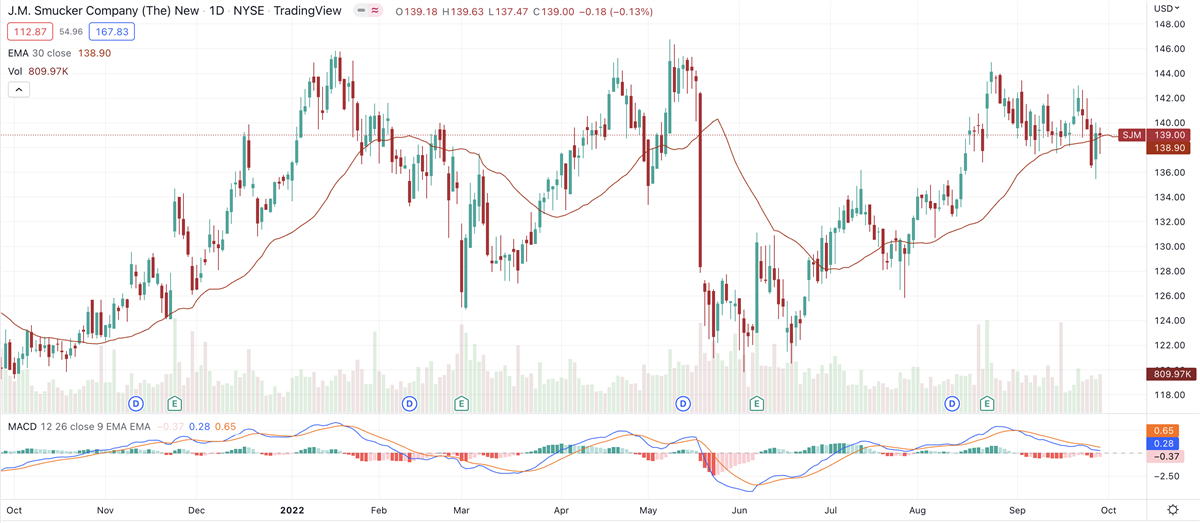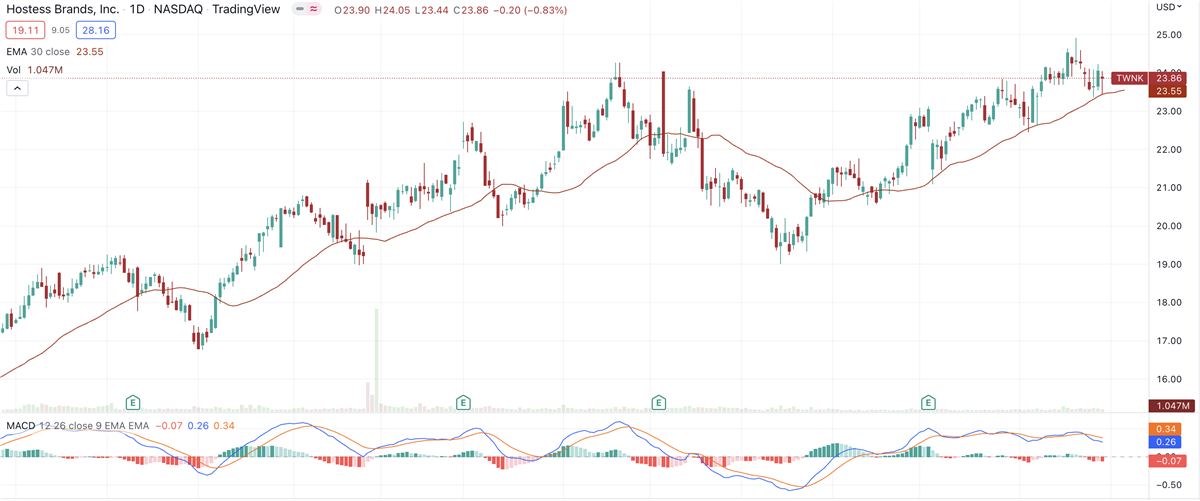- Processed-foods maker JM Smucker is holding up better than the broader market, as consumers shift their purchasing to groceries rather than discretionary items
- The chart action looks encouraging, as it may bode well for investors to snap up shares at a lower valuation
- Industry peer Hostess is also outpacing the market, with institutional investors buying shares of the Twinkie and cupcake maker
Investors learned from Target (NYSE: TGT) and Walmart (NYSE: WMT) that consumers are shifting purchases away from discretionary items and toward groceries. One company benefiting from continued spending on food is JM Smucker (NYSE: SJM), famous for making jams and jellies, but also the parent company of other well-known brands.

MarketBeat.com – MarketBeat
The stock has been holding up better than 90% of those in the broader market. It’s returned 10.21% in the past three months, and 4.68% year-to-date. The outperformance versus the market is due to that uptrend in the past three months.
More recently, the stock has been trending lower, but in an orderly fashion. Its downward trajectory in the past month has resulted in a 1.70% decline, outperforming the S&P 500, of which it is a component. The index is down 8.31% during that time.
Smucker’s brand portfolio includes Carnation Evaporated Milk and Eagle Condensed Milk in Canada and Jif peanut butter, as well as Laura Scudder peanut butter, Knott’s Bery Farm foods, and Santa Cruz organic products, among others.
It owns Folger’s and Bustelo coffees, and Dunkin’s at-home coffee products, along with pet food brands such as 9 Lives, Milk-Bone and Gravy Train.
The company has been profitable for many years, although some years earnings grew and other years they declined. Analysts see the company’s earnings coming in at $8.46 per share this year, which is fiscal 2023, then growing by 12%, to $9.51 per share, in fiscal 2024.
According to MarketBeat analyst data, the consensus price target on the stock is $138.82, a downside of 0.13%, essentially where it’s trading now. Shares closed Thursday at $139.
Analysts have a “hold” rating on Smucker.
Its return on equity is 12%, which is not as high as you’d like to see in a healthy growth stock. Its price-to-earnings ratio is 16. Again, that is not at growth-stock levels, but that’s to be expected, given the erratic nature of Smucker’s price lately as well as the company’s up-and-down earnings performance.
The chart shows promise, as in the spring and summer it continually undercut its March structure low of $124.89. While that may seem counterintuitive that a lower price is a sign of potential, it’s actually productive that investors with less conviction are paring back their positions or selling out. That can clear the deck for new buyers to come in at a lower valuation, which in turn, sets up a fresh rally.
Packaged food makers like Smucker have been among the market’s top performers lately. Maybe it’s a need for comfort food in the current environment, but Hostess Brands (NASDAQ: TWNK) hasn’t exactly been a Ding Dong lately, with a three-month gain of 16.34%.
Like everything else, Hostess has been chopping along with market volatility, without getting much traction in the short term. However, it did something most stocks haven’t been able to: It rallied to an all-time high this month, rising to a session peak of $24.91 on September 21. As the market itself plummeted on September 23, Hostess also fell, but managed to close the gap between that day’s high and the prior session’s low, a sign of support from institutional investors.
Rather than rest on the success of familiar and long-established product lines such as Twinkies (note the stock’s ticker), Hostess Cupcakes and Snoballs, the company also makes and markets bread and other bakery products under different brand names.
Perhaps more importantly, Hostess continues to innovate, developing new products and researching “snacking occasions” where consumers are likely to reach for a Hostess treat.
That’s exactly the kind of thing big investors like to see. According to MarketBeat institutional ownership data, Hostess has seen more institutional buying than selling in the past year, which bodes well for retail investors who may want to nibble at the stock. 
J. M. Smucker is a part of the Entrepreneur Index, which tracks some of the largest publicly traded companies founded and run by entrepreneurs.